Feature & Comment
Yameen Rasheed: Selected works
April 23 2018 will mark a year since blogger and satirist Yameen Rasheed was murdered. The Maldives Independent is re-publishing some of his work to commemorate what he stood for.
Published
6 years agoon
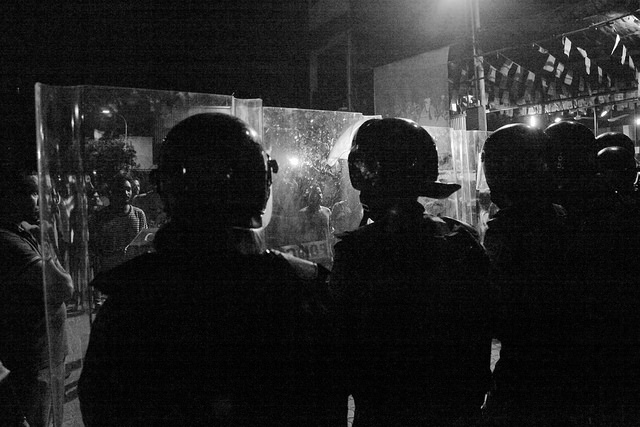
April 23 2018 will mark a year since blogger and satirist Yameen Rasheed was murdered. The Maldives Independent is re-publishing some of his work to commemorate what he stood for.
The following piece appeared in September 2011.
The right to remain silent
When a non-Muslim man publicly declared his disbelief in religion at a well-attended public lecture by Dr Zakir Naik in May 2010, the preacher on stage reacted with wide-eyed surprise and told his audience he was told the Maldives was a ‘100% Muslim’ society.
Now that he knew better, he corrected the statistic to “100% minus 1”.
The new statistic did not sit well with certain local Islamist NGOs and by day break there was already a press release demanding the man’s death, failing immediate repentance.
After a couple of days of national pandemonium, with multiple online groups demanding the apostate’s murder, order was finally restored when the man publicly declared his faith in Islam and apologised for the “agony” he had caused.
However, this delicate balance would be upset again less than two months later when another non-Muslim Maldivian, 25 year old Ismail Mohamed Didi, was discovered hanging from the ATC tower of Male’ International airport.
There was a swell of outrage – not because a young man was driven to suicide – but because news websites had published emails he’d sent to aid agencies shortly before his death.
Other reactions were even more confounding, with some even suggesting that the whole thing was a devious plot by “enemies of Islam” to undermine National Security – what other motive could possibly have led him to choose to so publicly hang himself from an airport tower?
Maybe it was because he had worked there for seven years? Maybe he was unable to handle the combined stigma of an internal workplace investigation, and ostracism by friends and family after he – in his own words – ‘foolishly admitted’ his non-religious views to his friends? Perhaps he thought his life in the Maldives was worthless and devoid of any value if he did not keep paying lip service to a belief he did not feel?
Perhaps he should have just exercised his right to remain silent. But he didn’t, and the sacred statistic tragically changed to ‘100% Muslim minus one dead man’.
Then in August 2011, reports emerged of a Maldivian girl in a southern atoll who professed to be non-Muslim, once again changing the statistic to ‘100% Muslim minus one dead man, and one deviant girl’.
— “Unique country” – “Special case” —
Research conducted by the Pew Forum on Religion and Public Life estimates the number of Maldivian Muslims at 98.4% of the population.
The report was met with derision by then State Minister of Islamic Affairs, Adhalaath party leader Mohamed Shaheem Ali Saeed, who claimed the researchers did not have ‘appropriate information’ and reiterated the familiar assertion that the Maldives continued to be 100% Muslim.
The Maldives holds an unenviable 6th position on a global index of severe government restrictions on religious beliefs. In comparison, the State of Israel – often accused of by many Maldivians of curbing minority rights – comes in at the 41st position.
Even in the aftermath of the democracy movement, the Maldives has continued to lodge a reservation on Article 18 of the UDHR and ICCPR, which proclaims the right to freedom of thought, conscience and religion as an inherent right of all humans.
The Maldives, which sits on the UN Human Rights Council, pleads that we should be treated as a ‘special case’ – a unique country where an entire population, barring one dead man and one aberrant girl, has always held exactly the same beliefs for centuries.
A US State Department report made public last week observed that religious freedom continued to be ‘severely restricted’ in the Maldives. The report added that there were “limited reports of societal abuses or discrimination based on religious affiliation, belief, or practice.”
While there has been no papal style inquisition to systematically weed out minorities, this hasn’t been for the lack of trying. In November 2009, MP Muttalib proposed that non-Muslim foreigners should be barred from practicing their religion even in the privacy of their own bedrooms.
The first draft of the Religious Unity Regulations produced by the Ministry of Islamic Affairs criminalised the act of depicting or describing any other religion in a positive manner, while also arming itself with the power to deport foreigners at will.
— A brotherhood of intolerance —
The comments in the media following news reports about the US State Department’s observations were marked with familiar hostility – with many responders questioning the United States’ right to even comment on Maldivian law.
In heaping scorn on the audacity of America to comment on our constitution, however, the commentators seek to avoid facing the hard question – does the repeated assertion that the Maldives is ‘unique’ and ‘special’ also allow it to claim exemption from explicit declarations of the Qur’an as well?
Decades of carefully exercised political control over religious narrative in the Maldives has left in its wake a culture of intolerance among the general public that is not only unsympathetic to wider views on non-Islamic religions, but is also hostile to Islamic academics and Muslim religious scholars who espouse a more humane form of Islam.
In other words, our society is not only hostile to other religions, but also to the myriad other available interpretations of Islam as well.
When Dr Abdulla Saeed of Melbourne University and his brother, former Attorney General Dr Hassan Saeed, published a book titled ‘Freedom of Religion and Apostasy in Islam’ arguing that the law of apostasy and capital punishment was out of sync with modern times, there was a massive uproar leading ultimately to a ban on the book.
In early 2008, Dr Afrasheem Ali, generally regarded as a “liberal” religious scholar, came under fire after he argued that singing was not un-Islamic – thus contradicting the position of the Supreme Council of Islamic Affairs. The man reportedly had stones thrown at him outside a mosque.
Secular Muslim Maldivians as well as anonymous, non-Muslim Dhivehi bloggers who dare to demand a more pluralistic society often find themselves facing undisguised contempt, harassment and violent threats.
— Islam says what? —
Muslims scholars around the world repeatedly affirm that Islam does not permit compulsion in religion.
Ali Gomaa, the Grand Mufti of Egypt, uses explicit Qur’anic verses such as “To you is your religion and to me is mine” to arrive at the ruling that “the Qur’an permits freedom of belief for all of mankind.”
Quoting further from the Qur’an, he says “God does not prevent you from being kind to those who have not fought you on account of your religion or expelled you from your homes, nor from dealing justly with them, indeed God loves the just.”
And yet, self appointed guardians of Islam in the audience rushed to physically attack Mohamed Nazim immediately after he proclaimed his disbelief, and one also remembers the swift press release demanding his murder the next morning.
Regarding such intolerance, the Grand Mufti Ali asserted in an article that “none of these extremists have been educated in genuine centres of Islamic learning. They are, rather, products of troubled environments and their aim is purely political and has no religious foundation.”
Syrian Imam Mohamed Bashar Arafat, who recently visited the Maldives, said in an interview to Minivan News that “We cannot deny the basic human right to life in the name of culture.”
The Imam also said “The Quran… gives people the freedom to worship, the freedom to choose their own religion, right or wrong”.
— Political suicide —
Many Maldivian MPs and senior government officials privately admit their hands are tied when it comes to the issue of freedom of religion. Simply put, to advocate universal human rights is the easiest way of committing political suicide in the Maldives.
The problem of religious discrimination had already been identified by the visiting UN Special Rapporteur on freedom of religion or belief, Asma Jahangir, in a 2006 report that expressed concerns about lack of religious freedom in the Maldives. It noted that while the old constitution did not technically demand all citizens to be Muslim, it presumed this was the case.
While any thoughtful person would readily see the absurdity of a state unilaterally declaring a citizen’s beliefs, the average Maldivian voter continues to justify this position by clinging to the “we’re special” argument.
The new Maldivian constitution, drawn up during the highly polarised and unstable political climate of the Maldivian democracy movement, where everyone and their grandma was being accused of attempting to import “other religions” to the Maldives, went one step further and made it explicitly unlawful for a Maldivian to profess any faith other than Islam.
Many interpret this to mean that a Maldivian Muslim who chooses to abandon the faith would automatically be stripped of citizenship and become a stateless refugee (In direct contravention of Article 15 of the UDHR, which states that no citizen can be arbitrarily deprived of nationhood but – why not? – the Maldives could presumably plead a “special” exemption in this case too).
However, a Maldivian government delegation, answering questions from the UN Committee on the Elimination of Racial Discrimination, denied this saying the constitution was clear that no citizen could be deprived of citizenship under any circumstance, and that the Muslim-only clause applied only to foreigners seeking Maldivian citizenship.
In the absence of a legal precedent or court ruling, the provision remains ambiguous.
Yet, the refusal of mainstream media and politicians to touch this human interest issue and a severely outrage-prone public sentiment has made one thing astoundingly clear: non-Muslims in the Maldives may exist as physical flesh-and-bones entities, but if they value their lives, liberty and security, then they must adhere to the strict code of conformity and total silence.
Surely, then, the statistic must in this case be updated to read ‘100% Muslim minus one dead man, one impious girl, and thousands forever condemned to silence.’
Photo: Munshid Mohamed
Related Posts
 Government house calls for Maldivians insulting Islam on social media
Government house calls for Maldivians insulting Islam on social media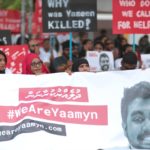 Hope for justice: Yameen Rasheed’s murder two years on
Hope for justice: Yameen Rasheed’s murder two years on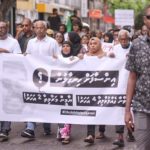 ‘Don’t let go’: President marches with family of murdered blogger
‘Don’t let go’: President marches with family of murdered blogger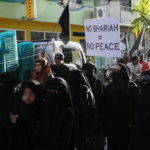 Yameen Rasheed: Selected works
Yameen Rasheed: Selected works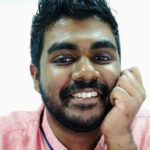 Yameen Rasheed: Who’s Who
Yameen Rasheed: Who’s Who Yameen Rasheed murder hearing cancelled for ‘administrative reasons’
Yameen Rasheed murder hearing cancelled for ‘administrative reasons’
You may like
-


Maldives Independent suspends operations
-


EPA rejects Maafaru runway expansion project
-


Infrastructure development pushing islands to ‘tipping point’
-


Military alert level raised as ‘precautionary measure’
-


Taxi driver was fatally stabbed during robbery
-
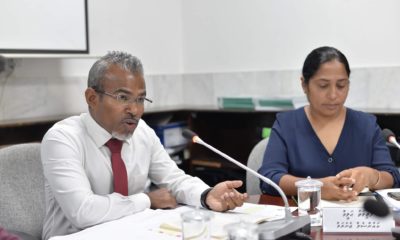

Arbitration case filed in Singapore over Fushidhiggaru lagoon

Maldives Independent suspends operations

Iyaz on Female Circumcision

EPA rejects Maafaru runway expansion project

Infrastructure development pushing islands to ‘tipping point’


